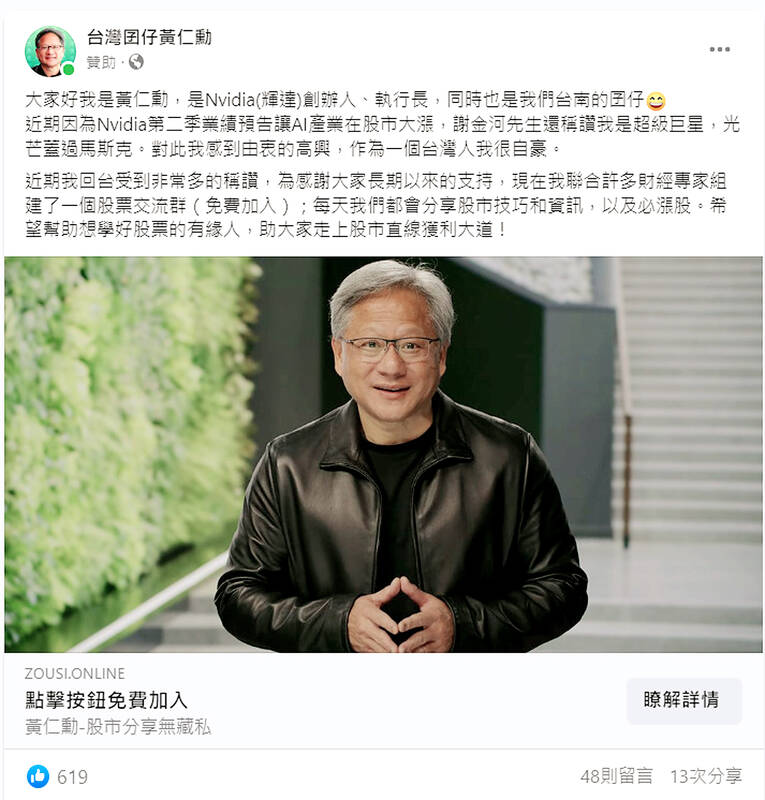The Criminal Investigation Bureau (CIB) has contacted Meta, the parent company of Facebook, to remove fake advertisements promoting “Jensen Huang’s stock investment chat group.”
Jensen Huang (黃仁勳), the Taiwanese-American CEO of Nvidia Corp, was in the media spotlight during a visit to Taiwan last week.
Citing accelerating artificial intelligence applications, Nvidia on May 24 said that its sales this quarter would reach US$11 billion, soaring 64 percent from a year earlier and beating a market estimate of US$7.2 billion, which caught many market analysts off guard.

Photo: Screen grab from Facebook
The GPU designer posted more than US$2 billion in net profit and US$7 billion in sales for the first quarter, both topping Wall Street expectations.
CIB officials said the Facebook advertisement was clearly fabricated, but it was still circulated widely and has led to complaints that the social media platform was doing nothing to curb the spread of fake advertisements.
“Scammers are good at following the latest trends,” a CIB official said on condition of anonymity.
The CIB said the advertisement was titled “Jensen Huang, Taiwan’s native-born kid,” and was accompanied by authentic information about Nvidia’s second-quarter forecast boosting the stocks of AI firms.
However, the next part of the advertisement was made up by the scammers, which said: “We thank people for their support. Now, with financial experts, we have set up a stock market investment chat group to share updates on daily stock movements and tips on when to buy and sell. We hope everyone can profit on the stock market,” the CIB said.
CIB officials said some people might have difficulty discerning the fraudulent advertisement from genuine promotions.
“We are working to prevent people falling for such scams. We have set up an anti-fraud unit to help people distinguish real news from fake news,” the CIB official said.
The bureau said it would treat the posting of fake advertisements as a criminal offense.
It urged people to contact the CIB’s “165” anti-fraud hotline to report bogus investment news and scams.
Additional reporting by CNA

The Ministry of Foreign Affairs (MOFA) yesterday voiced dissatisfaction with the Comprehensive and Progressive Agreement for Trans- Pacific Partnership (CPTPP), whose latest meeting, concluded earlier the same day, appeared not to address the country’s application. In a statement, MOFA said the CPTPP commission had "once again failed to fairly process Taiwan’s application," attributing the inaction to the bloc’s "succumbing to political pressure," without elaborating. Taiwan submitted its CPTPP application under the name "Separate Customs Territory of Taiwan, Penghu, Kinmen and Matsu" on Sept. 22, 2021 -- less than a week after China

THE GOOD WORD: More than 100 colleges on both sides of the Pacific will work together to bring students to Taiwan so they can learn Mandarin where it is spoken A total of 102 universities from Taiwan and the US are collaborating in a push to promote Taiwan as the first-choice place to learn Mandarin, with seven Mandarin learning centers stood up in the US to train and support teachers, the Foundation for International Cooperation in Higher Education of Taiwan (FICHET) said. At the annual convention of the American Council on the Teaching of Foreign Languages held over the weekend in New Orleans, Louisiana, a Taiwan Pavilion was jointly run by 17 representative teams from the FICHET, the Overseas Community Affairs Council, the Steering Committee for the Test of Proficiency-Huayu, the

A home-style restaurant opened by a Taiwanese woman in Quezon City in Metro Manila has been featured in the first-ever Michelin Guide honoring exceptional restaurants in the Philippines. The restaurant, Fong Wei Wu (豐味屋), was one of 74 eateries to receive a “Michelin Selected” honor in the guide, while one restaurant received two Michelin stars, eight received one star and 25 were awarded a “Bib Gourmand.” The guide, which was limited to restaurants in Metro Manila and Cebu, was published on Oct. 30. In an interview, Feng Wei Wu’s owner and chef, Linda, said that as a restaurateur in her 60s, receiving an

Kaohsiung Mayor Chen Chi-mai (陳其邁) on Monday announced light shows and themed traffic lights to welcome fans of South Korean pop group Twice to the port city. The group is to play Kaohsiung on Saturday as part of its “This Is For” world tour. It would be the group’s first performance in Taiwan since its debut 10 years ago. The all-female group consists of five South Koreans, three Japanese and Tainan’s Chou Tzu-yu (周子瑜), the first Taiwan-born and raised member of a South Korean girl group. To promote the group’s arrival, the city has been holding a series of events, including a pop-up